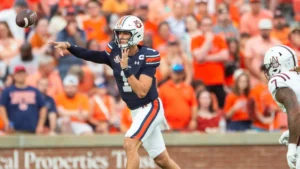No worries, but it sounds weird that quarterback Payton Thorne is adamant about not playing again if Hugh Freeze remains the head coach, citing why…
Quarterback Payton Thorne’s recent comments about his future in football have stirred up a fair amount of controversy. His declaration that he won’t play again if Hugh Freeze remains the head coach has raised eyebrows across the sports community. While it may sound surprising, Thorne’s stance reveals deeper issues at play, particularly regarding coaching philosophy, player-coach relationships, and the overall direction of the program.
Thorne’s concerns seem rooted in a fundamental disagreement with Freeze’s coaching style and the team’s approach to player development. For a quarterback, the relationship with the head coach is crucial; it shapes their performance on the field and influences their confidence. If Thorne feels that Freeze’s strategies don’t align with his own vision for success, it can lead to frustration and disillusionment. A quarterback’s success often hinges on trust in their coach’s game plan and the ability to execute it seamlessly. If that trust is absent, it can significantly hinder performance.
Moreover, Thorne’s comments highlight the importance of a supportive environment for players. A coach must create a culture where players feel valued and understood. If Thorne believes that Freeze’s leadership style doesn’t foster this kind of environment, it makes sense that he would contemplate stepping away from the game. It’s not just about the X’s and O’s; it’s about emotional and mental support, too.
Additionally, the dynamics of college football have changed, with players increasingly empowered to voice their opinions. The transfer portal has given athletes more agency than ever before, allowing them to seek opportunities that better fit their personal and professional aspirations. Thorne’s statement could also be seen as a strategic move to signal his desire for change, potentially influencing administrative decisions about coaching staff.
Ultimately, while Thorne’s declaration may sound extreme, it reflects a growing trend among players who prioritize their own development and well-being. It underscores the need for alignment between players and the critical role that this relationship plays in a team’s success. As the situation unfolds, it will be interesting to see how both Thorne and the program respond to these challenges.

Leave a Reply